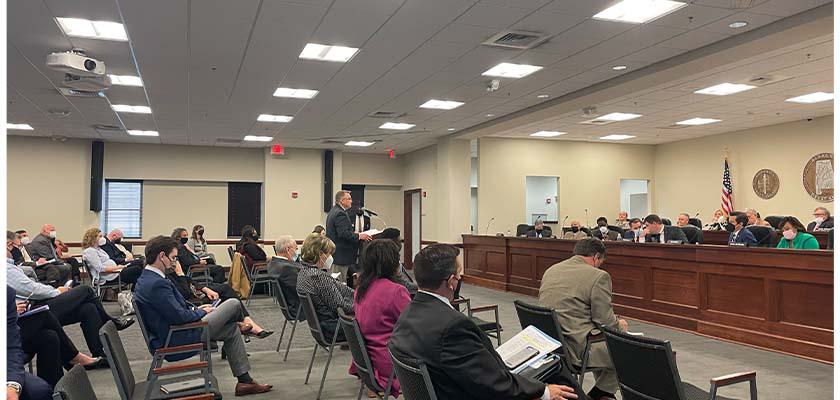A bill that has been dubbed an anti-riot bill has passed the House Judiciary Committee.
HB2, presented by Rep. Allen Treadaway (R – Morris), has drawn protestors and advocates from all over the state to speak out.
The bill seeks to create a classification of crime for assault of first responders, as well as other laws adding to the definitions of what constitutes a riot. The bill further would require a mandatory holding period of 24 hours for anyone arrested for participating in a riot, as well as a compulsory 30-day minimum sentence.
This bill would also provide that if a political subdivision of the state dissolves or defunds a local law enforcement agency, the political subdivision may not receive any state grant or aid money.
The bill defines a riot as “the assemblage of five or more persons in conduct which creates an immediate danger of property or injury to persons.”
Many have criticized the bill for its ambiguous use of language and the bill’s ability to allow large groups to be prosecuted for the actions of a few bad actors. Further criticisms of the bill have stated that it will enable police to discriminate against minority groups.
The bill was debated in the judiciary committee last week, with several speakers against the bill. Protestors assembled outside the State House, speaking through a megaphone and waving various banners audibly during the committee meeting.
The bill further defines an aggravated riot.
“A person commits the crime of aggravated riot if, after receiving an order to disperse by a law enforcement officer or when in violation of a curfew, the person intentionally participates in a riot, the participants of which collectively cause damage to property in an amount which exceeds two thousand five hundred dollars ($2,500) or cause physical injury to any one or more persons.”
David Gespass, the co-chair of the Alabama Chapter of the National Lawyers Guild, spoke against the bill in the committee on Feb. 2.
“The main danger, I would say there were two. The first is, it will intimidate people and chill people’s ability to exercise their rights,” Gespass told 1819 News. "The passage [of the bill] is going to make people who would otherwise participate in demonstrations afraid to do so. The second part is that it penalizes acts of individuals and imposes that criminal penalty on all participants, at least potentially. [Treadaway] talked about riots, assault, and looting, as if those things were not illegal. As if police could not pinpoint individuals and arrest them. By this bill, it threatens anyone who participates.”
On Wednesday, Treadaway defended the bill stating, “stats from the FBI [show a] 55% increase in assault and killing of police officers.
“[Some] 165 were officers assaulted in 2020,” Treadaway said. “Half of those came from confrontations with protestors.”
Treadaway claims the bill does not limit the ability to peacefully assemble, stating, “It doesn’t suppress anyone’s First Amendment right.”
Treadaway referred to the riots that took place in Birmingham in 2020, stating that he believed the peaceful assemblage of Black Lives Matter protestors was “hijacked” by “well-financed and well organized” groups attempting to subvert the protests intentionally.
Treadaway claimed that the current laws are not sufficient to deal with rioting, and defended the mandatory 24-hour hold, claiming that the rioters in Birmingham had a designated person at the jail with a “bag full of cash” to bail out any that were arrested.
Many in the committee criticized the power this gives law enforcement, stating that the bill's ambiguous language would allow for mass arrests during demonstrations or protests.
“We have a system that holds people accountable,” Treadaway replied. “You have to put trust in the law enforcement officers and the court system.”
The bill passed through committee with two amendments.
To connect with the author of this story, or to comment, email craig.monger@1819news.com.










